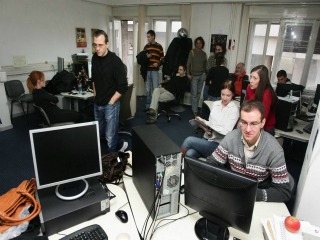- Home
- /
- Media on corruption
- /
- Events
- /
- Investigation: Murky Serbian Media Sector Masks Monopoly Risk

Investigation: Murky Serbian Media Sector Masks Monopoly Risk
Vienna and Belgrade When workers in most industries take issue with the management, they rely on the media to publicise their cause. It follows that when media workers have a grievance, publicity should be available on tap.
When workers in most industries take issue with the management, they rely on the media to publicise their cause. It follows that when media workers have a grievance, publicity should be available on tap.
The protesting employees of Avala TV, a stricken Serbian broadcaster, must be wondering why it has taken so long.
They have been on strike for the past 20 days because they have not been paid for more than five months. Though they have been complaining since October, they have struggled to attract much attention from politicians, and have only recently been noticed by the press.
Avala is one of 11 broadcasters that have a coveted nationwide broadcasting license, granted by the state. The privately-owned station, with 132 employees, was set up in 2006 on the promise that it would provide top quality programmes and business news.
It is currently biding its time playing re-runs of imported TV shows and movies. All live, original programmes have been taken off air. A box in the corner of the screen counts the days since the strike began.
“We must keep trying, but I have lost almost all hope that we will ever be paid,” an editor from the network told Balkan Insight.
Avala’s staff fear the company is about to be declared bankrupt. They believe they will not recover their wages unless a third-party intervenes in their dispute with the management.
However, the broadcasting regulator and the government have yet to respond to the crisis.
Though the network’s owners owe their staff wages, there is no evidence that they have broken any laws.
But in attempting to trace these owners, Balkan Insight has uncovered a more disturbing dimension to the troubles at Avala.
The investigation into the structure behind the network explains why its staff is so frustrated with the authorities’ silence. It also explains why they are now lobbying the government to make media ownership more transparent.
This year, Serbia will hold an election and seek to convince the EU it is a suitable candidate for eventual entry into the bloc. The state of its media will come under close scrutiny. The crisis at Avala suggests it should brace for criticism.
‘Such a funny guy’
The search for Avala’s owners begins with an old building on Führichgasse, a street in the centre of Vienna.
The building hosts the office of the lawyer, Johannes Werner Krauss. He is also the owner and sole employee of Greenberg Invest, a firm that is registered at the same address as his legal practice.
Since May 2010, this company has held a 48.4 per cent stake in Avala. Last year, the Anti-corruption Council, a government watchdog in Belgrade, released a report alleging that Greenberg was in fact a front for Zeljko Mitrovic, a Serbian media mogul.
If true, this would mean Mitrovic had violated Serbian laws that aim to restrict the formation of monopolies in the media. The mogul, who has been nicknamed “the Murdoch of the Balkans”, already has full ownership of another channel with a nationwide license, TV Pink.
A law adopted in 2002 says the owner of a nationwide broadcaster cannot acquire a stake larger than five per cent in another such network. Since 2008, Mitrovic has also held a stake in Avala – but in accordance with the rules, it is capped at 4.95 per cent.
However, the Anti-corruption Council says the true size of his stake is bigger. “It is assumed that Mitrovic has the majority share in TV Avala through the Austrian company, Greenberg Invest, whose true owners cannot be established,” the report says.
Numerous efforts to interview Mitrovic drew a blank. Over the course of two months, Balkan Insight also contacted Krauss by email and phone for a response to the allegation that he represented Mitrovic’s interests. No reply was forthcoming, although the lawyer’s office confirmed it had received the requests for an interview.
Knocking on the door in Führichgasse seemed to be the only way to reach Krauss. After a short wait in the hallway, a man wearing a well-tailored dark blue suit appeared. He introduced himself as Mr Krauss.
From his manner, it was apparent that he felt no need to explain his purchase of the shares in Avala. “I am an investment company and I don’t talk about my investments,” he said. Krauss said he could not recall exactly how he had acquired the shares in the TV station, or at what price.
Edging towards the door to cut the interview short, he made light of the questions. Asked about his interest in a Serbian broadcaster, he smiled and said he “loves the Balkans”. Asked about his connection to Mitrovic, he answered: “Everybody knows him. He is such a funny guy.”
‘No mechanism’ for investigation
Under Austrian law, Krauss has every right to keep quiet about Greenberg. He is listed as the only shareholder in the investment firm, but even if this were not the case, he would not be obliged to disclose the names of any partners.
In Serbia, the main body in charge of enforcing ownership transparency is the national broadcasting regulator, the RRA.
Article 41 of the 2002 Law on broadcasting says the RRA must approve any changes in the ownership of a nationwide broadcaster.
One would expect that Greenberg’s credentials – particularly the source of its funds – would have been thoroughly vetted in Belgrade before the firm was allowed to buy a stake in a national broadcaster.
But an official from the RRA says potential buyers for a stake in a TV station must meet only two requirements. They must submit a document proving that their company is registered, and they must appear in person before the RRA.
According to Goran Karadzic, the vice-president of the RRA, Krauss met both these obligations. Asked whether his office had looked into Greenberg’s business history, Karadzic told Balkan Insight: “We have no mechanism for getting into that.”
If the RRA had been empowered to examine Greenberg, they might have noticed that the firm’s accounts were heavily in the red just four months before it acquired its stake in Avala.
According to an annual financial report obtained by Balkan Insight, Greenberg had only €173.99 in its account on December 31, 2009. That year, the company made a loss of €14,869.16 and had accumulated a debt of €177,786.58.
In November 2011, Greenberg missed its deadline for submitting a financial report for 2010. It faces a minor penalty for the delay. As a small business, it is only required to provide a basic balance sheet every year.
This document might have shown whether the firm had paid for its Avala stake in full, buying out a diverse group of smaller shareholders.
However, it may not necessarily have explained how, over the course of a few months in 2010, Greenberg was able to find €493,000 for the €1.17 million worth shares of the broadcaster. That question could only have been raised by a regulatory body – but Serbian law did not require the RRA to do so.
Danger to democracy
According to the Anti-Corruption Council, Avala is not the only national broadcaster whose ownership is less than transparent. The report released by the body last September says it is difficult to determine the true shareholders behind nine of the 11 TV or radio channels that operate on a nationwide frequency.
Despite the claims made by the corruption watchdog, no clear evidence has been produced of any wrongdoing on the part of Mitrovic. Nor is there any evidence that Krauss and the RRA broke the law when they approved Greenberg’s investment in Avala. Krauss was also within his rights when he refused to discuss his business with Balkan Insight. Although Greenberg’s share in Avala may be entirely lawful, the ease with which it was acquired is striking. The Serbian media regulator asked fewer questions of Krauss than the reporter who briefly confronted him outside his office.
Although Greenberg’s share in Avala may be entirely lawful, the ease with which it was acquired is striking. The Serbian media regulator asked fewer questions of Krauss than the reporter who briefly confronted him outside his office.
According to foreign observers, the rules for acquiring a stake in nationwide TV networks are too lax to be truly effective. Through the use of a front company, a media mogul may sidestep the curbs on monopolies without obviously breaking the law.
“There is no single law that allows for media ownership to be obscured,” says a media lawyer with an international body who was interviewed on condition of anonymity because they were not authorised to speak to the press. “However, loopholes in the existing laws allow the spirit of media reform to be contradicted.”
The exploitation of these loopholes ultimately poses a threat to Serbia’s democracy.
Dragana Nikolic Solomon, the head of the media department in the OSCE’s mission to Belgrade, says citizens must know who controls their press if they are to gauge the credibility of the information they are served.
Transparent ownership is also essential for “maintaining the plurality of opinion in society” and for preventing the “unacceptable concentration” of power in the media, she says.
Senior EU officials in Serbia have also repeatedly emphasised the need for more transparency in the press. A statement from the office of the EU delegation in Belgrade on January 9 said the lack of clarity in media ownership was “a major issue” in the path of Serbia’s EU bid. “It is as important as all the other political issues,” the statement said.
Mired in debt
While the obscurity behind so many Serbian national broadcasters is bad news for democracy, it is a more urgent problem for the unpaid staff at Avala. Uncertainty over who owns the broadcaster makes it harder for them to recover what they are owed.
The doubts have been there since the start. Avala was created in March 2006. A month later, it became one of five new networks to win a nationwide broadcasting license from the state.
Its success aroused suspicion in some quarters. Other players who were beaten in the bid for the same frequency included a heavyweight, Germany’s RTL, as well as Belgrade-based BKTV and Nis-based TV5.
The RRA defended its award of the license, saying Avala’s owners had promised to invest heavily in the outlet and provide premium content.
The single biggest stake, 45.65 per cent of the shares, was held by Danko Djunic, who was once a deputy prime minister in the government of the former strongman leader, Slobodan Milosevic. Djunic also played a key role in controversial privatisation programmes during and immediately after the Milosevic era.
He has maintained his stake in Avala. Balkan Insight has repeatedly approached him for comment, but he has not responded.
The remaining shares in the broadcaster were originally split between a variety of small firms and institutions. Their stake, amounting to just under 50 per cent, was bought by Greenberg Invest in 2010.
Mitrovic acquired his 4.95 per cent stake in February 2008, at a cost of €120,211.96.
Despite his relatively small investment, the mogul went on to become president of the network’s board of shareholders. Financial records for 2010 show that his companies also made several short-term loans to the company.
Avala’s employees say he has played a crucial role in the day-to-day management of the network. According to Nikola Vukomanovic, a TV anchorman who is representing the strikers, Mitrovic took part in a board meeting on December 29. Krauss did not attend the meeting. Vukomanovic, who was present, told Balkan Insight that Mitrovic said that Krauss had “given up” on the venture.
According to Nikola Vukomanovic, a TV anchorman who is representing the strikers, Mitrovic took part in a board meeting on December 29. Krauss did not attend the meeting. Vukomanovic, who was present, told Balkan Insight that Mitrovic said that Krauss had “given up” on the venture.
There seems little doubt that Avala is in deep trouble. Financial records for 2010 analysed by Balkan Insight and financial experts show the network owed €25.7 million for loans and services. Its income in the same year was €2.6 million. For the employees chasing their wages, the options are shrinking.
Karadzic, the vice president of the RRA, said the regulator could not investigate the ownership of Avala because there was no indication that the law had been broken.
He suggested the state prosecutor should step in if there was any suspicion of wrongdoing.
However, Tomo Zoric, a spokesman for the prosecutor’s office, said the onus was on the regulator to initiate an investigation.
“If the RRA doubts something, it should file a lawsuit and then we will start doing our job,” he told Balkan Insight.
The long road to transparency
The strikers from Avala say they have lost hope of any redress from Serbian institutions.
On January 8, they wrote an open letter to Serbian President Boris Tadic and Prime Minister Mirko Cvetkovic, urging them to adopt laws that would make media ownership more transparent. They say they have also sought help from the ministries of culture and media, and of labour.
As none of the appeals have been fruitful, the workers say they are now looking to international institutions to take up their cause.
Some press rights groups have spoken out for the strikers. The European Federation of Journalists, which represents over 260,000 media workers in 30 countries, voiced alarm at the treatment of Avala employees and called on Serbian institutions to protect their rights.
The Independent Association of Journalists in Serbia also backed the strikers and called for Serbian authorities to investigate the ownership of Avala.
According to Austrian legal experts, Greenberg could be forced to disclose its full financial records if the Avala case went to court.
Nikolic Solomon, from the OSCE office in Belgrade, says her organization had monitored and financed a working group that was tasked with drafting the law on transparency of ownership back in 2008. The law was last debated in January 2009. However, this legislation has not been passed.
"The road to a more transparent media sector is likely to be long and
uneven,” Nikolic Solomon says. She cautions that the process can take more than a decade.
“I am not saying that transparency will solve all the issues of the rich and politically connected setting the news agenda. That would be naïve. However, it is an essential first step. And it is a step that Serbia has yet to take,” she says.
|
|
Avala’s ownership structure
- Greenberg Invest – 48.41 per cent
- Danko Djunic – 45.65 per cent
- Zeljko Mitrovic – 4.95 per cent
- Economic Institute – 0.99 per cent
The Pink Empire
Mitrovic began his business activities in the 1990s, in a media environment that was tightly controlled by the ruling couple, Slobodan Milosevic and Mirjana Markovic.
The mogul’s Pink TV channel pioneered a new kind of populist programming, playing “turbo-folk” music and promoting nationalist ideals. Warriors and singers rubbed shoulders on its prime-time slots. The channel had the exclusive rights to broadcast the “wedding of the century” – the marriage of the alleged war criminal, Zeljko Raznatovic, aka Arkan, and the turbo-folk diva, Ceca.
At the time of Serbia’s transition to democracy in 2000, Pink had already obtained a nationwide license, giving it a head-start over rivals such as B92.
Since then, Pink’s empire has spread to neighbouring countries such as Bosnia, Macedonia, Slovenia and Montenegro. It currently has 15 satellite channels as well as a film studio near Simanovci, near Belgrade. However, the group’s fortunes have waned during the recent downturn. Pink Slovenia has failed to deliver, and several firms owned by Mitrovic are in financial trouble.
The RRA
The RRA’s members are approved by parliament and have long been exposed to pressure from the mighty business-political elite.
Soon after the regulator was created in 2003, three independent experts – Snjezana Milivojevic, Vladimir Vodinelic and Miroljub Radojkovic – left in protest.
Commentators have frequently complained about the RRA’s conduct – including its decision to award Avala a broadcasting licence.
All change at Avala
Mitrovic’s acquisition of a small stake in Avala in 2008 was followed by dramatic changes in personnel. About a hundred people lost their jobs and several top managers were replaced.
Srdjan Duric, the media adviser to the then-prime minister, Vojislav Kostunica, was appointed editor-in-chief. He was replaced after a few months by Aleksandra Radujko, a former anchorwoman at Pink. At the same time, her husband, Democrat Party member Branko Radujko, was made director of state-owned Telekom Srbija.
In March 2010, Avala’s managing board named Mitrovic a “special adviser to operational management”, effectively giving him a free rein in the hiring and firing of staff. His first move was to replace Radujko and install Robert Nemecek, the director of film programmes at Pink, as the new editor-in-chief. He lasted in the post until November that year, when the board dismissed Nemecek and appointed Bojana Lekic as editor-in-chief. In January 2012, Avala’s board member, Dusan Pancic, replaced Lekic as editor-in-chief.
This article was produced as part of a journalistic exchange programme between BIRN and Austrian Der Standard.
http://www.balkaninsight.com/en/article/murky-serbian-media-sector-masks-monopoly-risk


